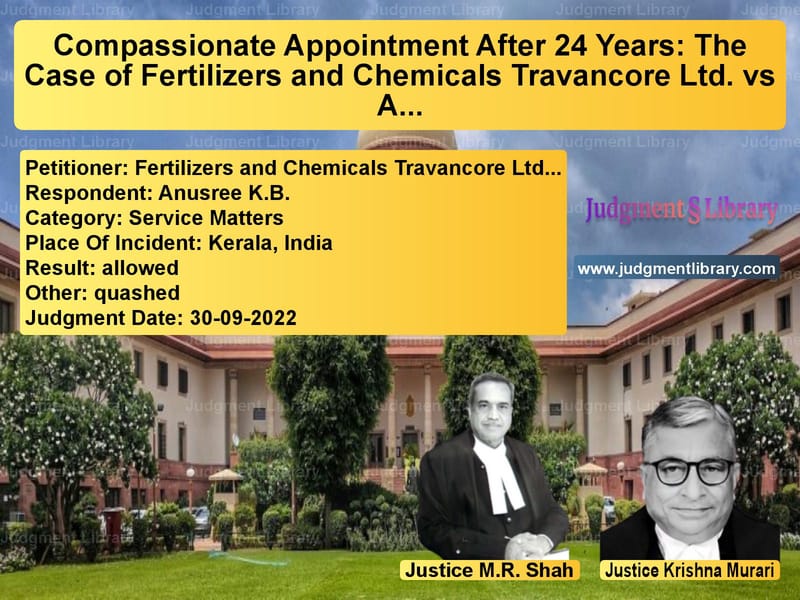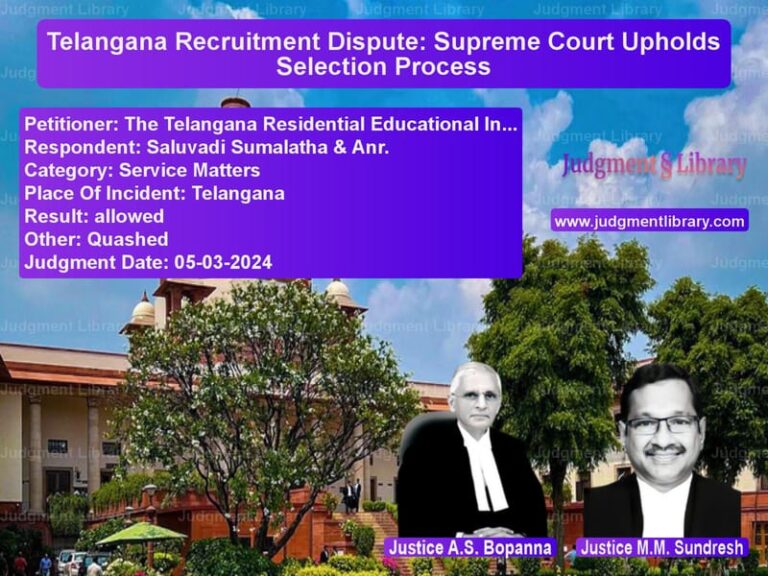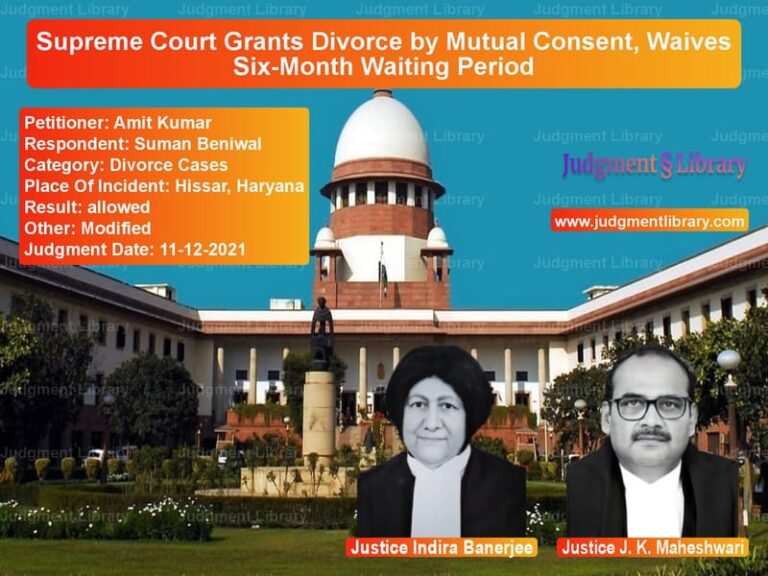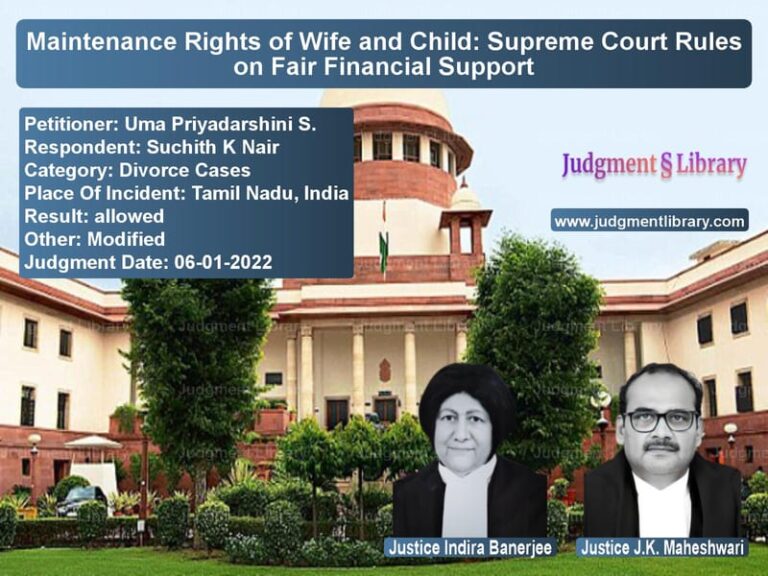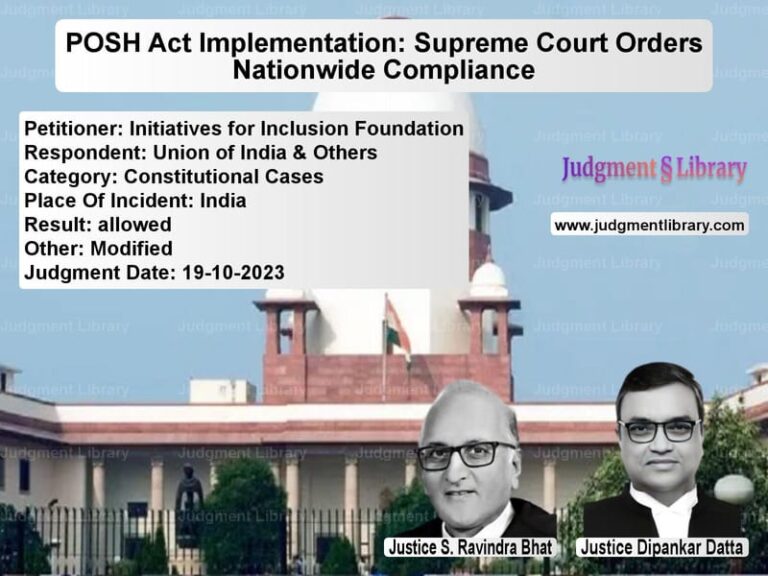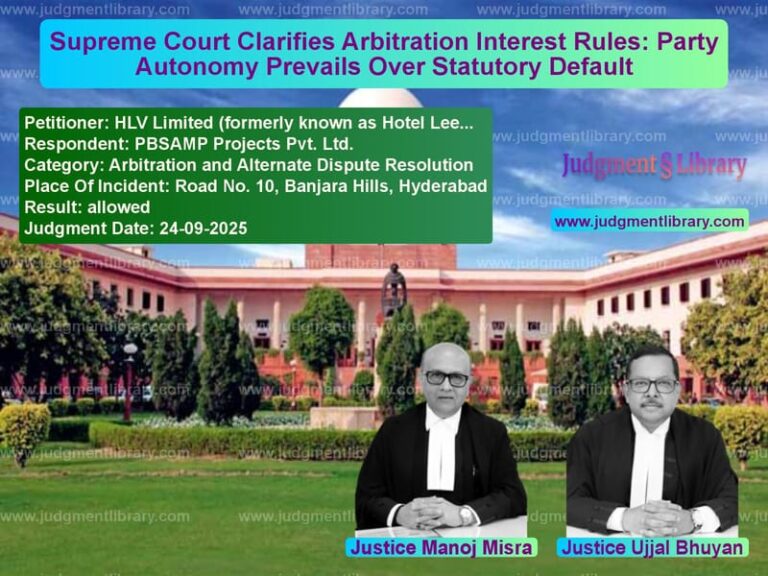Compassionate Appointment After 24 Years: The Case of Fertilizers and Chemicals Travancore Ltd. vs Anusree K.B.
The case of Fertilizers and Chemicals Travancore Ltd. & Ors. vs Anusree K.B. centers around the issue of granting compassionate appointments to the dependents of employees who have passed away while still in service. In this case, Anusree K.B., the daughter of a deceased employee of Fertilizers and Chemicals Travancore Ltd., sought employment under the compassionate appointment scheme, which was denied by the company after a period of 24 years following her father’s death. The legal battle revolved around whether she should still be eligible for such an appointment under the policy provisions of the company.
Background of the Case
The respondent’s father, employed as a loading helper with Fertilizers and Chemicals Travancore Ltd., passed away on 19th April 1995. At the time of his death, the mother of the respondent, who was the wife of the deceased, was employed and therefore ineligible for a compassionate appointment under the company’s policy. After 14 years, in 2009, Anusree K.B., the daughter of the deceased employee, applied for a compassionate appointment. However, her application was rejected in 2018 on the grounds that she was not listed as a dependent by the deceased employee and the company’s policy stipulated that only the widow, son, or unmarried daughter could be appointed on compassionate grounds.
The rejection of her application led to a legal challenge. The matter was initially taken up with the Single Judge of the Kerala High Court, who directed the company to reconsider the application. However, the company’s rejection of the application persisted. The case was then brought before the Division Bench of the High Court, which upheld the order of the Single Judge, leading to the current appeal before the Supreme Court.
The Petitioner’s Arguments
The petitioners, Fertilizers and Chemicals Travancore Ltd., argued that Anusree K.B. was not entitled to the compassionate appointment due to the significant delay in her application, which was made 24 years after her father’s death. The petitioners emphasized that the policy for compassionate appointments was meant to address the immediate financial distress faced by families following the sudden death of a sole breadwinner. Allowing such a claim after two decades would defeat the purpose of the policy, which is to provide relief during the immediate aftermath of a breadwinner’s death.
Furthermore, the petitioners pointed out that the respondent’s mother was employed at the time of her father’s death, which disqualified her from seeking a compassionate appointment under the company’s policy. Therefore, Anusree’s application was also disqualified based on the fact that she was not listed as a dependent in the records submitted by her father.
The petitioners relied on previous decisions, including those by the Supreme Court in cases such as Director of Treasuries in Karnataka vs. V. Somyashree (2021) and N.C. Santhosh vs. State of Karnataka (2020), which stressed that compassionate appointments should not be made arbitrarily, and must adhere to the specific eligibility criteria laid down in the relevant policies.
The Respondent’s Arguments
The respondent, Anusree K.B., argued that at the time of her father’s death, she was a minor and therefore could not apply for a compassionate appointment. Upon reaching adulthood, she applied for the appointment, only to be rejected on technical grounds related to the delay in her application. The respondent contended that the rejection of her application based solely on the delay was unfair and that she should be given an opportunity for the compassionate appointment, as the scheme was intended to provide relief to the dependents of deceased employees, regardless of the time elapsed.
Read also: https://judgmentlibrary.com/employment-dispute-over-obc-certificate-supreme-courts-ruling/
Moreover, the respondent highlighted that the rejection in 2018 was based on a misrepresentation that she was not listed as a dependent in the official records. She contended that this claim was factually incorrect, as the deceased’s family had always considered her a dependent. The respondent further argued that the delay was not due to any fault of hers but was a result of the lack of clarity on her eligibility for compassionate appointment. She also noted that she had been called for an interview in 2018, which suggested that the company had recognized her eligibility to some extent at that time.
The Court’s Analysis
The Supreme Court, while examining the case, referred to various precedents and legal principles governing the grant of compassionate appointments. The Court acknowledged that compassionate appointments are an exception to the general rule of public employment and are intended to provide relief to families facing financial hardship due to the sudden death of a breadwinner. The Court also emphasized that compassionate appointments are not a right, but a concession granted under specific circumstances.
The Court noted the key factors for granting compassionate appointments, as laid out in previous judgments. These include the financial condition of the family, the age of the applicant, the time elapsed since the death of the deceased employee, and the urgency of the family’s need for financial support. The Court also cited the ruling in Umesh Kumar Nagpal v. State of Haryana (1994), where it was held that the appointment is intended to help the family meet immediate financial needs, and not as a means to reward the family of the deceased employee.
The Court recognized that the policy’s purpose was to relieve families from immediate financial distress. The Court acknowledged the respondent’s claim that the delay in applying for the appointment was not her fault, but rather a result of her being a minor at the time of her father’s death and the subsequent lack of clarity regarding her eligibility. However, the Court also noted that the significant delay of 24 years undermined the very purpose of the compassionate appointment policy.
Final Judgment
The Supreme Court ultimately sided with the petitioners and quashed the decision of the High Court, thereby rejecting the respondent’s claim for compassionate appointment. The Court held that the appointment could not be granted after such a long delay, as it would go against the purpose of the scheme, which is designed to address immediate financial distress. The Court stated that allowing such an appointment after 24 years would set an undesirable precedent and defeat the object of the policy.
The Court also emphasized that compassionate appointments are meant to be made based on the norms in place at the time of the applicant’s consideration, and the eligibility criteria must be strictly followed. Given the long delay and the fact that the respondent’s mother had been employed at the time of her father’s death, the Court concluded that the application for compassionate appointment was not justified under the circumstances.
Significance of the Judgment
This judgment is significant in reaffirming the principles governing compassionate appointments in India. The Supreme Court emphasized that such appointments are an exception to the general rule and must be granted only when the immediate family members are in genuine financial distress due to the untimely death of the breadwinner. The decision underscores the importance of adhering to the eligibility criteria and the timelines set by the concerned policies.
The judgment also clarifies that while compassionate appointments may provide much-needed relief, they should not be viewed as a right or entitlement, but rather as a special concession aimed at alleviating immediate hardship. The ruling reinforces the need for a careful balancing act between providing justice to the families of deceased employees and maintaining the integrity and purpose of public employment policies.
Petitioner Name: Fertilizers and Chemicals Travancore Ltd..Respondent Name: Anusree K.B..Judgment By: Justice M.R. Shah, Justice Krishna Murari.Place Of Incident: Kerala, India.Judgment Date: 30-09-2022.
Don’t miss out on the full details! Download the complete judgment in PDF format below and gain valuable insights instantly!
Download Judgment: fertilizers-and-chem-vs-anusree-k.b.-supreme-court-of-india-judgment-dated-30-09-2022.pdf
Directly Download Judgment: Directly download this Judgment
See all petitions in Employment Disputes
See all petitions in Public Sector Employees
See all petitions in Judgment by Mukeshkumar Rasikbhai Shah
See all petitions in Judgment by Krishna Murari
See all petitions in allowed
See all petitions in Quashed
See all petitions in supreme court of India judgments September 2022
See all petitions in 2022 judgments
See all posts in Service Matters Category
See all allowed petitions in Service Matters Category
See all Dismissed petitions in Service Matters Category
See all partially allowed petitions in Service Matters Category

